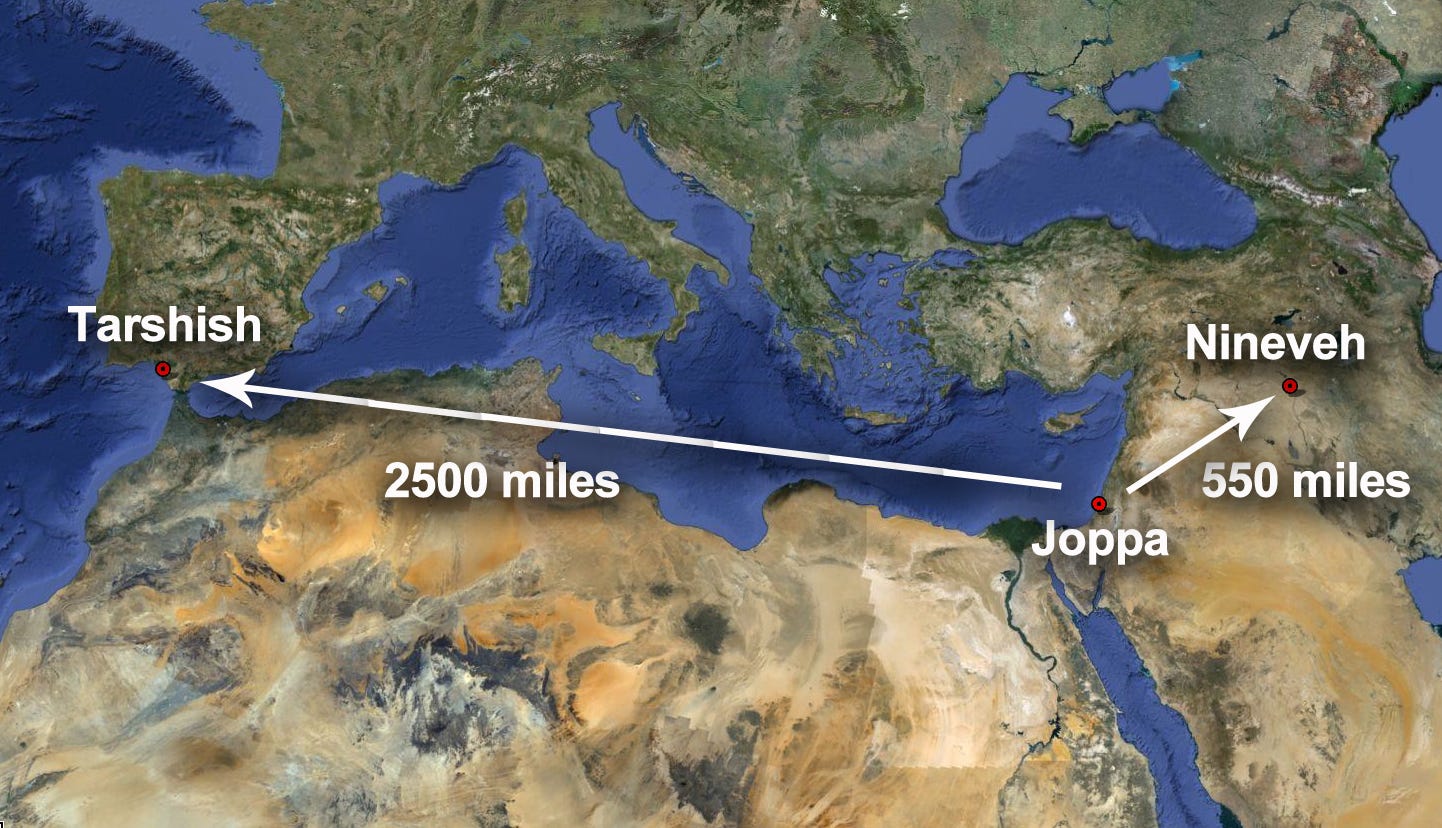Jonah 1 Part 2: Our Prophet Flees
Jonah 1:3, Matthew 8:5-10, Mark 6:1-6a - Disobedience comes from doubt and following our instincts creates danger
“But Jonah rose up to flee to Tarshish from the presence of the Lord. So he went down to Joppa, found a ship which was going to Tarshish, paid the fare and went down into it to go with them to Tarshish from the presence of the Lord.”
Jonah 1:3 NASB1995
God has clearly identified His commands to His prophet Jonah in verses 1 and 2 - Go to Nineveh (a large, Gentile city) and cry out against its wickedness. So what does His prophet Jonah do? He runs to the seaport Joppa and finds a ship going to Tarshish to “get away from God”. The map above shows a likely location of Tarshish, west of the Strait of Gibraltar in present-day Spain, although some Biblical scholars debate the exact location, only agreeing that it meant far away. In fact, the word Tarshish in Hebrew is תַּרְשִׁישׁ, which has these locational definitions:
a city of the Phoenicians in a distant part of the Mediterranean Sea to which the prophet Jonah was trying to flee
site unknown but perhaps in Cyprus or Spain
So why did Jonah disobey God? Enduring Word has a few ideas as to why Jonah chose to disobey and flee (links go to the Blue Letter Bible):
But Jonah arose to flee: Jonah was a reluctant prophet. He didn’t want to do what God told him to do. Several reasons for this have been suggested.
It may have been because he was given a difficult job to do. Nahum 3:1-4 gives us a good idea of how wicked the people of Nineveh were. Jonah had every reason to expect that at the very best, he would be mocked and treated as a fool. He might be attacked and killed if he did what the LORD told him to do.
It was also because Jonah didn’t want the Assyrians in Nineveh to escape God’s judgment. Imagine a Jewish man in New York during World War II hearing God say, “I’m going to bring terrible judgment on Germany. I want you to go to Berlin and tell Nazi Germany to repent.” Instead of doing it, the man heads for San Francisco and then gets on a boat for Hong Kong.
We may speculate on why Jonah did not want to do what God told him to do, but it is even better to think about why we don’t do what God tells us to do. God told Jonah to go and preach; every Christian has the same command in Matthew 28:19-20. With Jonah’s example before us, we have even less reason than Jonah for our disobedience.
In the sermon at our church last Sunday, the example of Jonah was used to frame a discussion about doubt, which can come from OR lead to disobedience. Jonah had a lack of assurance about what God wanted and a stubborn pride (as we will see when things go badly on the trip) and he rebelled against God. He also followed his emotional instincts and ran in the opposite direction of Nineveh, embarking on a journey that was far more dangerous. As Steve noted in a recent devotional, we cannot hide from God, because He is everywhere in His Universe. Here is more Enduring Word commentary, which says this so well:
Found a ship going to Tarshish: We don’t doubt that Jonah felt like going to Tarshish. There was an impulse within him driving him there, but it was a dangerous impulse. We may take Jonah as an example of the danger of doing things solely on the basis of mere impulse or feelings.
“Now, I very commonly meet with persons who say, ‘I felt that I must do so and so. It came upon me that I must do so and so.’ I am afraid of these impulses – very greatly afraid of them. People may do right under their power, but they will spoil what they do by doing it out of mere impulse, and not because the action was right in itself.” (Charles Spurgeon)
An impulse may be very brave, yet wrong (Jonah was very brave in embarking on such a long sea journey).
An impulse may appear to be self-denying, yet wrong (it cost Jonah much in money and comfort to go on this long sea journey).
An impulse may lay claim to freedom, yet be wrong (wasn’t Jonah free to go to Tarshish?).
An impulse may lead someone to do something that they would condemn in others (what would Jonah say to another prophet disobeying God?).
An impulse can make us do to God or others what we would never want to be done to ourselves.
So he paid the fare: It seemed easy enough. Perhaps even Jonah felt that the LORD provided the money for the fare! This shows the danger of being guided by circumstances.
“Providence or no providence, the Word of the LORD is to be our guide, and we must not depart from it under pretext of necessity or circumstances. It is very easy to make up a providence when you want to do so. If you sit down and try to find in the ways of God to you an excuse for the wrong which you mean to commit, the crafty devil and your deceitful heart together will soon conjure up a plea for providence.” (Spurgeon)
We need to carefully listen to the words of Charles Spurgeon in that last bullet. If you use God as an excuse for a wrongdoing, the enemy and your deceitful heart will conjure up a plea for “providence”. Circumstances should not guide our hearts.

Faith is the opposite of doubt. Doubt in the modern church is often looked at as a part of faith, but this is a dangerous idea and people are really decimated by accepting doubts as a “normal” course of business in their journey of faith. When we doubt or disobey like Jonah, we are really telling God that our way is best. Jesus marveled at displays of great faith and also of little faith during His time on Earth:
“And when Jesus entered Capernaum, a centurion came to Him, imploring Him, and saying, “Lord, my servant is lying paralyzed at home, fearfully tormented.” Jesus *said to him, “I will come and heal him.” But the centurion said, “Lord, I am not worthy for You to come under my roof, but just say the word, and my servant will be healed. For I also am a man under authority, with soldiers under me; and I say to this one, ‘Go!’ and he goes, and to another, ‘Come!’ and he comes, and to my slave, ‘Do this!’ and he does it.” Now when Jesus heard this, He marveled and said to those who were following, “Truly I say to you, I have not found such great faith with anyone in Israel.”
Matthew 8:5-10 NASB1995
“Jesus went out from there and *came into His hometown; and His disciples *followed Him. When the Sabbath came, He began to teach in the synagogue; and the many listeners were astonished, saying, “Where did this man get these things, and what is this wisdom given to Him, and such miracles as these performed by His hands? Is not this the carpenter, the son of Mary, and brother of James and Joses and Judas and Simon? Are not His sisters here with us?” And they took offense at Him. Jesus said to them, “A prophet is not without honor except in his hometown and among his own relatives and in his own household.” And He could do no miracle there except that He laid His hands on a few sick people and healed them. And He wondered at their unbelief.
Mark 6:1-6a NASB1995
Slaying the twin dragons of doubt and disobedience often requires extraordinary measures with help from the Holy Spirit and deep reliance on Word and Prayer, as we will see in future passages in Jonah. In the next devotional, we see how God sends a great storm to interrupt the journey while Jonah sleeps - Jonah 1:4-6.
Heaven on Wheels Daily Prayer:
Dear Heavenly Father - Please help me to grow in faith and obedience to you and to put aside doubts. Although obeying may be difficult, it is always a better course of action than acting on instincts or trusting circumstances. Amen.
Scripture quotations taken from the (NASB®) New American Standard Bible®, Copyright © 1960, 1971, 1977, 1995 by The Lockman Foundation. Used by permission. All rights reserved. lockman.org
Commentary from Enduring Word by David Guzik is used with written permission.




We may speculate on why Jonah did not want to do what God told him to do, but it is even better to think about why we don’t do what God tells us to do. God told Jonah to go and preach; every Christian has the same command in Matthew 28:19-20. With Jonah’s example before us, we have even less reason than Jonah for our disobedience.
Well written Barb I also especially liked these 2 enduring word notes
It was also because Jonah didn’t want the Assyrians in Nineveh to escape God’s judgment. Imagine a Jewish man in New York during World War II hearing God say, “I’m going to bring terrible judgment on Germany. I want you to go to Berlin and tell Nazi Germany to repent.” Instead of doing it, the man heads for San Francisco and then gets on a boat for Hong Kong.